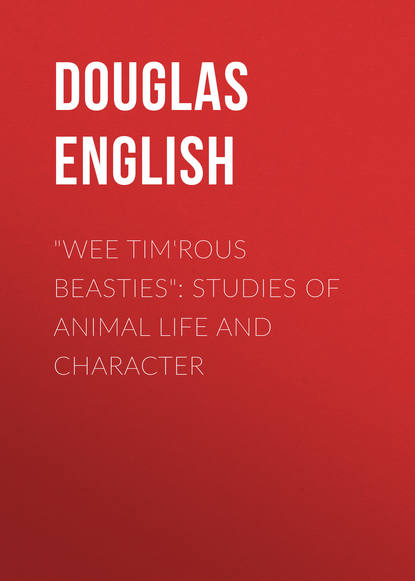По всем вопросам обращайтесь на: info@litportal.ru
(©) 2003-2024.
✖
"Wee Tim'rous Beasties": Studies of Animal life and Character
Настройки чтения
Размер шрифта
Высота строк
Поля
I confessed I did not know much.
“I never knew any one write about them who did,” he went on. “What was I saying when you interrupted me?”
“You said you were the odd egg,” I replied. “What is an odd egg?”
“Do you know what a clutch is?” His intonation was insolence itself.
“A clutch,” said I, “is, I believe, a sitting of eggs destined to be simultaneously hatched.”
“Perhaps you may have noticed,” said he, “that in our family”—his every feather bristled with importance, and the white bars on his wings were beautifully displayed—“we do not confine ourselves to a single monotonous pattern of egg.”
“A string of variegated sparrows’ eggs was one of my earliest treasures,” said I.
“Well, then, if you know that much, and don’t know what the odd egg is, you must be a fool,” said he.
It is hard to be insulted by a sparrow, and, as it is, I have toned down the expression, but I preserved a meek silence.
“Any one,” he went on, with bland condescension, “who has seen a few clutches of sparrows’ eggs, and has not noticed that there is an odd egg in each clutch, must be an uncommonly poor observer.”
“It is not in the books,” I ventured to protest.
“Books!” he screamed, “books! What do the people who write books know about sparrows? And yet, do you know that there has been more ink spilt over sparrows than over any other bird? that laws innumerable have been passed concerning sparrows? that associations have been formed to exterminate sparrows? that—that—that–”
THERE IS AN ODD EGG IN EACH CLUTCH.
The excitement was too much for him; he had been keeping time with his tail to this declamatory crescendo. With the last effort he cocked it a shade too high, lost his balance, and landed, considerably ruffled, some four feet beneath his own reserved and particular twig. His eye was on me, and I felt it too serious a matter for laughter. He made what was evidently intended for a dignified ascent, choosing, with minute exactness, the steps he had originally employed on my approach. It was a full minute before he broke the silence, and for that full minute I had to preserve my gravity.
IT WAS A FULL MINUTE BEFORE HE BROKE THE SILENCE.
“Have you any clutches by you?” he said at last.
I had, and fetched them.
“Now,” said he, “look at that one, four dark and one light; look at this, four light and one dark; and at this, six light mottled, and one among them with a few black spots.”
I had to admit that it seemed true.
“True,” said he, “of course it’s true. Didn’t I tell you that I was the odd egg myself?”
“Well, one of you had to be the odd egg, I suppose?”
“Wrong again,” said he. “What you don’t seem to realize is, that the odd egg is nearly always addled; in my case it wasn’t.”
“Then, in your case,” said I, “there was one more mouth to feed than your parents expected. How did they take it?”
“Mother kept it quiet as long as she could,” said he.
“And father?”
“Father didn’t find out for a day or two, and when he did, he pushed one of my brothers over the side of the nest—he did holler for his life!”
The little beast was actually chuckling at the recollection.
“He hung head downwards by one leg, and wouldn’t let go till father dug his beak into him.”
“Brutal,” I murmured.
“Brutal! not a bit of it. You can’t feed more than a certain number of nestlings; besides which, there wouldn’t be room in the nest. As it was, I fell out before I could fly.”
“What happened then?”
“Why, the old folks came and fed me, and helped me back again the shortest way up the bark. Brutal, wasn’t it? A martin wouldn’t do that.”
“Which reminds me,” said I, “that you were not born in a martin’s-nest. Are trees the fashionable quarter just now?”
“They’ve come in more since thatched roofs went out,” said the sparrow. “It’s tree or martins’-nests nowadays.”
“You do really drive away the martins, I suppose?”
“Yes,” he sniggered; “poor, dear little martins! Look here,” said he, and his voice changed from a snigger to vicious earnest. “We sparrows are just about sick of being accused of bullying martins. White of Selborne started it, but he didn’t know what it would lead to. Would you like to know the truth of the matter?”
It was one of the things I did want to hear, and I nodded assent.
“The disappearance of martins is a loss really of national importance,” he began, in a sickly whine. “It is a shame to see how the pretty house martins are decreasing in this country at the hand of the sparrows,” he continued. “He drives away our migratory and pre-eminently useful insect-eating birds, even turning out the eggs of the owners and using the locality for its own nest.”
He was obviously quoting from the pro-martin authorities, and I stopped him.
“I have heard all that before,” said I.
“There’s a fair amount of it about, pages and pages,” said he; “there’s one story, for instance, of twenty or thirty martins blocking up the bold, bad sparrow inside the nest, which the said bold, bad sparrow had usurped. What do you think of that?”
“I think it is untrue,” I promptly replied.
“It is untrue,” said he; “but it isn’t far away from truth, for all that. Many a dead sparrow has been found in a martin’s-nest, and many a time the entrance was too small for a sparrow to have got out of; but, still, it wouldn’t take a healthy sparrow long to break up a martin’s-nest.”
“What has happened then?” said I.
ONE PART OF WHITE ARSENIC TO FIFTEEN PARTS OF CORN-MEAL, IS THE USUAL RECIPE.
“Why, of course, the sparrow was dying when it got in. One part of white arsenic to fifteen parts of corn-meal is the usual recipe. It is illegal, as you doubtless know, but it has the advantage of acting slowly. Of course, if we saw a friend of ours writhing about in the feeding-ground, we should give that feeding-ground a wide berth.”
“I see,” said I; “but what about the entrance being plastered up?”
“It is never quite plastered up,” said he; “and even if it was, a healthy, able-bodied sparrow could knock the whole thing to pieces with two pecks. No; when there are any disputes as to proprietorship between sparrows and martins, the martins have a trick of waiting till the sparrow is out, and then narrowing down the entrance so that the sparrow will have a job to get in decent nest material. When a live sparrow is in possession, he very soon lets callers know it. The martins, in these cases, miss their usual greeting, and probably conclude that the sparrow is away, whereas he is really dead inside. That’s just about the whole truth of the matter.”
“But why on earth,” I protested, “can’t you build a proper nest for yourself?”
“I don’t know why it is,” said he, “but the mere thought of a martin makes a sparrow feel bad inside. Why does a dog naturally go for a cat? One thing is quite certain, however. We both fancy human dwellings, and, if we left the martins altogether alone, they would have all the best places in no time. Now, that wouldn’t be fair at all. I appeal to you as a fellow Briton. We are British born and bred. We stay with you all the year round. The martin only comes to look you up in the fine weather. Then he puts on his showy foreign manners, and you say, ‘How charming! so different to those dirty, vulgar sparrows!’ but, as soon as the weather breaks, off he goes. Now, a hard winter is no fun for the sparrows. We are glad of any shelter we can get, and the martins’ deserted nests come in very handy. Not only do we use them, but we keep them from falling to pieces, line them with feathers, and make them into snug winter quarters. Back comes the martin in the spring. ‘Dear me!’ he says, ‘most gratifying, I am sure. So kind of you to act as caretaker. Why, I declare, the old place looks better than when I left. Of course, you won’t mind my coming in at once. I’ve got to make my family arrangements for the season.’ ‘Not quite,’ says the sparrow. ‘If it hadn’t been for me, this nest would have been down in the last gale. I’ve put money into this nest, and you can jolly well go and build another. You ought to have stayed to look after it, if you wanted it again.’”






